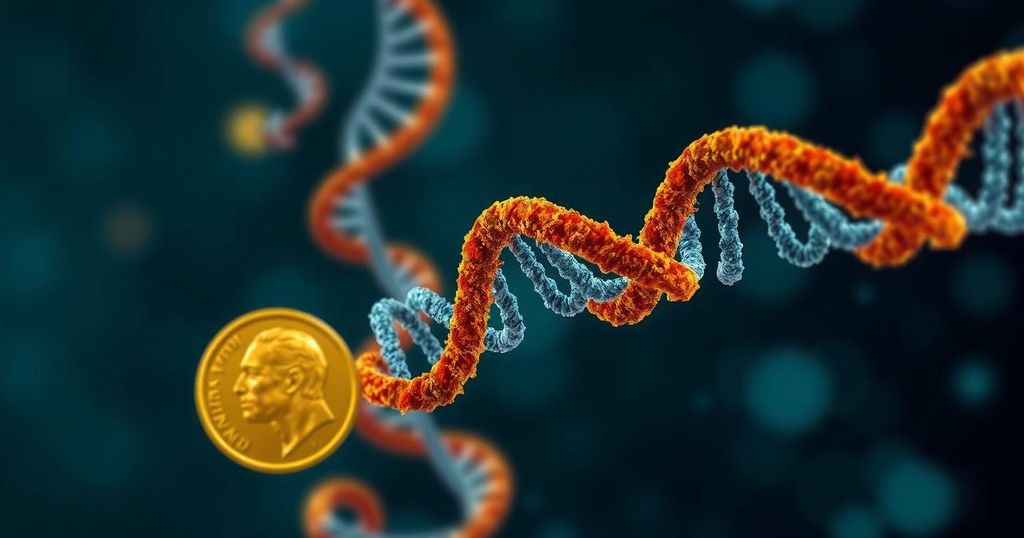Science
AM, AMBROS, AP, ASSOCIATED PRESS, CLAIRE FLETCHER, EUROPE, FLETCHER, GARY RUVKUN, GERMANY, HARVARD MEDICAL SCHOOL, HARVARD UNIVERSITY, IMPERIAL COLLEGE LONDON, MASSACHUSETTS GENERAL HOSPITAL, MASSACHUSETTS MEDICAL SCHOOL, MEDICINE, NOBEL FOR MEDICINE, NUTRITION, PANDEMIC, RESEARCH, RU, RUVKUN, SCIENCE, STOCKHOLM, SWEDEN, UNIVERSITY OF, UNIVERSITY OF MASSACHUSETTS MEDICAL SCHOOL, VENTURE CAPITAL, VICTOR AMBROS, WORMS
Liam Kavanagh
0 Comments
Nobel Prize Recognizes Pioneers in MicroRNA Discovery
The Nobel Prize in Medicine has been awarded to Victor Ambros and Gary Ruvkun for their discovery of microRNA, which serves as a key regulatory mechanism in cells. Their work provides a pathway to potential treatments for diseases like cancer by understanding and manipulating gene regulation. Ambros and Ruvkun’s research represents a pivotal moment in genetics, emphasizing the importance of basic scientific exploration in advancing medical progress.
In a striking validation of scientific exploration, the Nobel Prize in Physiology or Medicine has been awarded to American scientists Victor Ambros and Gary Ruvkun for their pioneering discovery of microRNA. This microscopic marvel acts as a critical switchboard in cellular operations, directing when and how genes express themselves. Their groundbreaking work illuminates the pathway toward potential treatments for formidable diseases, including cancer, by manipulating these tiny strands of genetic material.
Ambros and Ruvkun initially set their sights on the mysteries of genetic timing within worms, unveiling a previously unknown layer of gene regulation essential for the development of complex life forms. Their findings have forever changed the understanding of genetics, revealing mechanisms that have influenced evolution for hundreds of millions of years. With microRNA now recognized for its substantial role in controlling gene activity, the prospects for medical advancements could be revolutionary.
As both scientists prepare to receive their prestigious award, they reflect on the profound impact it represents. Ruvkun shared his realization of the Nobel’s transformative power, stating, “The Nobel is just mythic in how it transforms the life of people who are selected.” Ambros added that this recognition signifies the value of fundamental research, highlighting the benefits that arise from curiosity-driven science.
MicroRNAs, often overlooked in scientific discourse, have emerged as vital players in the regulation and potential treatment of diseases. Leading experts believe that understanding these molecules might pave the way for innovative drug treatments and could serve as indicators for various ailments, including cancer. With the previous year’s Nobel Prize focusing on mRNA techniques that facilitated COVID-19 vaccine development, the focus now shifts to how microRNAs might influence future therapeutic strategies.
As they ready themselves for the Nobel ceremony in December, the recognition of Ambros and Ruvkun’s work not only honors their contributions but also echoes a larger appreciation for the unforeseen discoveries that arise from scientific inquiry. The ongoing exploration of microRNA’s role in both health and disease could dramatically alter the landscape of biology and medicine, promising a cascade of new therapeutic avenues and understanding.
The recent awarding of the Nobel Prize highlights the significance of microRNA, small strands of genetic material that serve as vital regulators of gene activity within cells. Discovered by Victor Ambros and Gary Ruvkun, microRNAs control critical functions by turning genes on or off, akin to the operation of a switchboard. This discovery illuminates intermediary mechanisms that impact how organisms develop and function over evolutionary time. Their findings offer potential for therapeutic implications, particularly in battling diseases like cancer, making their work a cornerstone in modern molecular biology and medicine.
The recognition of Victor Ambros and Gary Ruvkun with the Nobel Prize underscores the monumental nature of their discovery regarding microRNA. Their research not only redefined understanding of gene regulation but also opened doors for novel approaches in treating complex diseases. As the world witnesses the unfolding potential of microRNA, it becomes clear that fundamental scientific discovery pays dividends far beyond initial expectations, pushing the boundaries of medicine and biology.
Original Source: www.ap.org




Post Comment